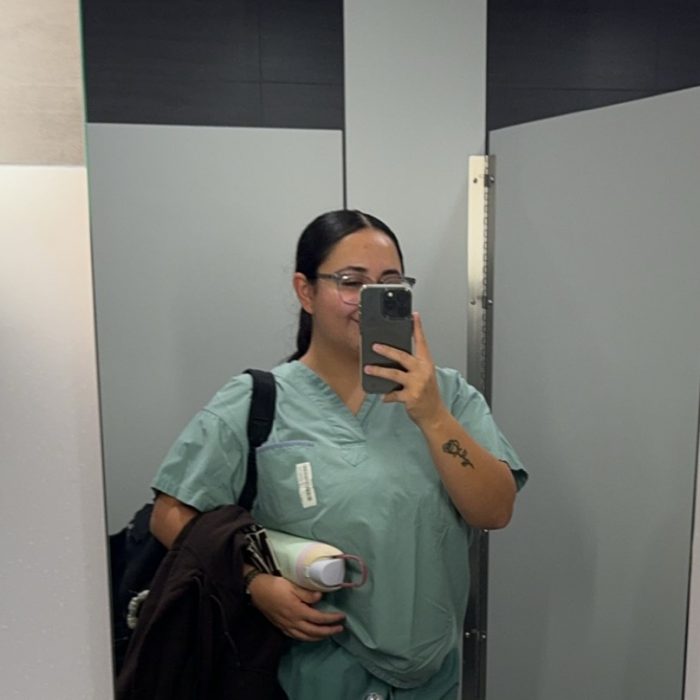
Kaydence Morgado Thomas in the Helen Glass Centre for Nursing
Celebrating Indigenous nurses
Meet Kaydence Morgado Thomas, proud Indigenous nursing student whose cultural identity shapes her path in health care
In recognition of National Nursing Week (May 12-18, 2025) we spoke with Kaydence Morgado Thomas, fourth-year Indigenous nursing student at the College of Nursing in UM’s Rady Faculty of Health Sciences, about her journey in the bachelor of nursing program and the impactful role Mahkwa omushki kiim: Pathway to Indigenous Nursing Education (PINE) had in her success.
Morgado Thomas is a proud Cree and Portuguese woman, and her spirit name is Chief Mountain Woman. Her father is from Norway House Cree Nation, and while she was raised in Winnipeg, she’s always felt a strong connection to her Cree roots and community. Morgado Thomas carries her identity and culture with pride, and strives to reflect that in everything she does, especially in her journey through nursing.
In this Q&A, she opens up about her experiences as an Indigenous nursing student, the challenges she’s overcome and her advice for students thinking about nursing or the health-care field.
What inspired you to pursue a career in nursing, and how did you become involved in the PINE program?
My inspiration to become a nurse started when I worked as a support worker with the Awasis Agency of Northern Manitoba. I had the opportunity to work closely with a young girl who was receiving care at Health Sciences Centre.
The time I spent with her, and seeing her smile even in the hospital setting, touched me deeply. It showed me the power of compassion, presence and care. It also made me aware of the many challenges Indigenous people face in the health-care system, including discrimination and lack of culturally safe care. I wanted to be part of the change.
Becoming involved in the PINE program was a natural next step. I had no doubt about it when applying. It’s been a space where I feel supported, connected and seen, not just as a student, but as an Indigenous future nurse with lived experience and purpose.
How has being part of the PINE program impacted your student experience?
Being part of the PINE program has been incredibly grounding and empowering. Nursing school is challenging and having a community like PINE has made a huge difference.
It’s not just about academic support, it’s about connection, mentorship and sharing stories with others who understand what it means to walk in two worlds.
The program has helped me stay connected to my culture while navigating me to the right direction, and it’s also given me confidence in my voice as an Indigenous nursing student.

Kaydence poses for a mirror-selfie in her nursing scrubs
Can you share a moment from your nursing journey that made you feel proud or reaffirmed your choice to pursue this path?
One moment that really stood out to me was during a clinical placement where I had the opportunity to care for a patient who was feeling very anxious and overwhelmed. I took the time to sit with them, listen to their concerns and just be present in a way that felt natural and caring.
Over the course of the shift, we built a connection and by the end of it, they told me how much more comfortable and safer they felt because of how I treated them.
They even asked if I could be their nurse again. That meant the world to me. It reminded me of why I chose nursing in the first place. To make people feel seen, heard and respected, especially when they’re at their most vulnerable. Moments like that reaffirm that I’m exactly where I’m meant to be.
What advice would you give to other Indigenous students who are thinking about entering nursing or health care?
My advice would be to not let anyone tell you that you don’t belong. You do belong. Our communities need you. Our people need you.
Nursing school can be hard, but you are never alone. Lean into your culture, your community and programs like PINE that are there to lift you up.
Your lived experiences, your identity and your heart are strengths, not barriers. And most importantly, always remember your “why” as it will guide you through.
Anything else you’d like to share?
As an Indigenous student, there were times when I questioned if I truly belonged, if I was good enough, smart enough or even “Indigenous enough” to be part of a program like PINE.
Those doubts were heavy at times, especially navigating a space that wasn’t always built with us in mind. But through conversations with Elders, peers and the amazing staff at PINE, I started to see myself differently.
They reminded me that identity isn’t something we have to prove, it’s something we carry in our hearts, in our stories and in the way we walk in this world.
I’ve learned to be proud of who I am, where I come from and where I’m going. And, I want other Indigenous students to know you are more than enough, just as you.
Morgado Thomas is currently completing her final clinical placement at Ma Mawi Wi Chi Itata Centre, Inc. (Ma Mawi) and is looking forward to completing practicum this fall in Norway House Cree Nation.






